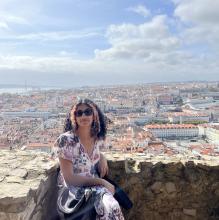Celine Waldmann, 2021-2023 GWSS Academic Counselor, interviewed two majors about their experiences for this article. Also, see below for information on “Sounds of Social Justice: Diasporic Routes of Music and Dance,” an Early Fall Start 2024 study abroad course in Spain organized by GWSS Professor Michelle Habell-Pallán.
More than 300,000 students in the United States participate annually in some form of study abroad experience. For many, it’s a chance to improve foreign language skills, to be immersed in another culture, and to gain confidence as they learn about themselves as they navigate life in a new setting. For Gender, Women & Sexuality Studies (GWSS) and Law, Societies & Justice (LSJ) double majors Sana Shetty and Stephany Janssen, studying abroad in León, Spain allowed them to see how concepts they encountered in their GWSS courses play out in the real world. They shared how their experiences as GWSS students informed not only their approach to coursework, but also the ways they dealt with personal aspects of their experiences abroad.

the Royal Palace of Madrid.
The program that Shetty and Janssen joined was focused on Spanish legislation regarding women and persons with disabilities. It culminated in a group research project on a topic of their choice. “Having the background in GWSS really helped me get more out of this program because I could really sculpt the things I was reading and the conversations I was having with my professor and within [student groups],” Janssen shared. Her group’s research project focused on survivors of domestic and gender-based violence for women with disabilities. She added, “I don’t think I would have picked that research proposal topic if I hadn’t been in GWSS because I already know a lot about that. I know that’s something that I’m passionate about.” This background allowed her to focus instead on furthering her knowledge in Disability Studies and the intersection of international, EU, and national policies in Spain, instead of having to start from scratch with her research. Janssen further explained, “I don’t think I would have done as good of a job if I didn’t have a background in GWSS. Because I know about CEDAW [Convention on the Elimination of All Forms of Discrimination against Women] and I know about the Istanbul Convention. I’ve been learning about that for three years in college. So that was really beneficial.”
Beyond the academic experience in Spain, both students negotiated culture shock, which is an integral part of study abroad learning experiences. While they welcomed the immersive experience and felt it helped them improve their Spanish skills immensely, they learned that European systems of racism and sexism share similarities but also diverge from those in the U.S. They observed different attitudes toward food and eating. They were also confronted with different attitudes toward colonialism and a different cultural vocabulary for discussing these issues. As Shetty shared, “[It’s hard to] enjoy the culture while also experiencing racial judgment and trying not to hate yourself or see yourself in the same way that they see you, which is really hard. I think in the first few weeks I was definitely looking in the mirror and being like, What are they seeing?”
In hindsight, Shetty felt she would have benefitted from doing more research before her departure: “If I had known beforehand, I would have still gone. I would have just been more prepared. I would have been able to process things differently and handle things differently. I would have been less affected by it, and I would have internalized it less because I would have understood that it was just how they think and it’s not anything to do with me.” When researching study abroad opportunities, it is important to ask questions about pre-departure preparation and seek resources for navigating discomfort and difference. (See, for example, books on this topic by UW Teaching Professor Anu Taranath.)
For Janssen, her coursework in GWSS helped her contextualize her experiences: “GWSS teaches you all the time that the extremes that you’re taught to be aware of, and the horrible sexism that we experience, are in no way our fault or something that we should have to experience. And I think the beautiful thing about that is that you find yourself allowing yourself to be angry at not just the worst things that can happen to a woman, like sexual assault and rape, but you find yourself being able to be angry about [people being dismissive] because you understand that it is part of a bigger system of sexism and you don’t feel so small. I think that that has been the biggest thing about GWSS for me: I don’t feel tiny anymore.” She added, “Having not only the emotional feeling to back that up, but also the academic knowledge is so fantastic.”

Both Janssen and Shetty offered some tips for students who are preparing to study abroad. Shetty explored ways to help herself process what she was seeing and experiencing: “I journaled everything I did and everything that happened. And I think that really helped me as a grounding kind of thing. And I went on a lot of walks, which was helpful because it’s just time to process.” She recommended that students look up local foods and dietary customs, especially if you have any dietary restrictions, to help plan meals and find foods that work for you. And she recommends familiarizing yourself with local attitudes and cultural norms: “For women of color who are traveling abroad, look up [the local attitudes toward race] and what stigmas there might be, what stereotypes there might be, and what insensitivities [you might encounter].”
Janssen recommended finding support among your peers, whether you’re traveling with a group of UW students or not: “I so highly encourage people to try to seek out any community that they can find. It is the best thing ever. That creates a great place of support and people who stick up for you. That collective support and understanding of positionality was so beautiful.” Janssen was adamant that being a GWSS major really affected what she took away from the whole experience, saying “I love GWSS so much. The classes I’ve taken in this major and the professors have shifted so much in the way that I think about myself and the way that I think about women. It is truly I think the most empowering major you could have.”
"Sounds of Social Justice: Diasporic Routes of Music and Dance"
Learn more about this exciting upcoming study abroad opportunity featuring GWSS Professor Michelle Habell-Pallan and Grammy-winner and MacArthur Foundation "Genius" Fellow Martha Gonzalez.